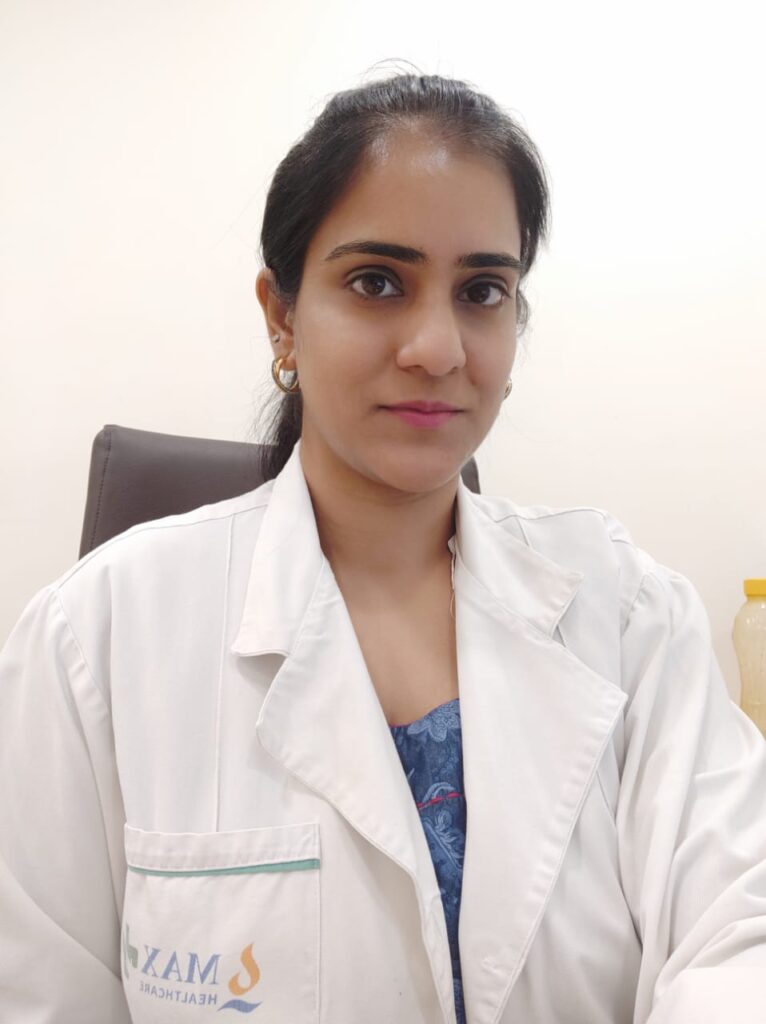
DR MANMIT KAUR HORA is a practicing dermatologist in Delhi. She has done her MBBS from Dr. D.Y Patil Medical College, Pimpri, Pune. After which she joined one of the oldest and most prestigious medical college in Kolkata for post-graduation. She has done M.D in dermatology, venereology and leprosy form IPGMER & SSKM HOSPITAL, KOLKATA, where she worked extensively in the out-patient and in-patient departments for three years. She received training in treating various skin diseases, dermato-surgical procedures and cosmetic dermatology.
As a medical student she has been actively involved in clinical research in the college and has presented scientific papers in various forums. She also has few publications and awards to her name
She has been associated with various reputed clinics and hospitals in Kolkata and Delhi. She is currently working in Max Smart super specialty hospital, Saket, Delhi as an Attending consultant.
She is an experienced skin & hair specialist and a trained cosmetic dermatologist. She helps people feel comfortable in their own skin and fall in love with themselves all over again. Her aim is to provide her patients with the best dermatology and cosmetology services to help them achieve their desired look and healthy skin.
Dr. Manmit thank you for taking time out of your busy schedule to talk to our readers
Public awareness is a big part of my job, so thanks for letting me use your platform to talk.
- Let’s start with the question patients ask us most “is there a way to get read of a scar”?
It depends on the type of scar a patient has. Some superficial scars like post inflammatory hyperpigmentation are completely treatable with topical creams or chemical peels. The deeper scars like Ice pick scars, box type scars and rolling scars require more extensive treatment in the form of Derma roller, Subcision and Lasers. Scars due to an injury can treated by combination Lasers and PRP. It is best to get your skin accessed by your dermatologist and discuss the treatment options.
Before and after photos of chemical peel:
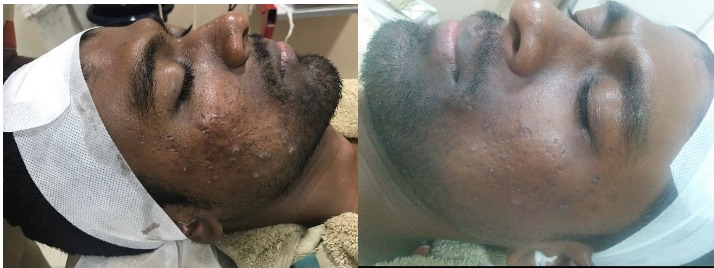
- Laser is the new shiny player in the game, I understand u have extensive experience in laser tech, what are the dermatological issues that can be solved with a laser?
Tremendous advances have been made in lasers in the field of dermatology. Different types of lasers are now available for treatment of various skin lesions such as warts, Syringomas, Vitiligo, Ingrown toe nails and Psoriasis Vulagris. Laser treatment is also used in the field of esthetic dermatology to treat skin pigmentation, melasma, dark circles, acne scars and for facial cosmesis such as in wrinkles, sagging skin and skin rejuvenation.
Before and After pic of scar treatment by q switch NDyag laser:
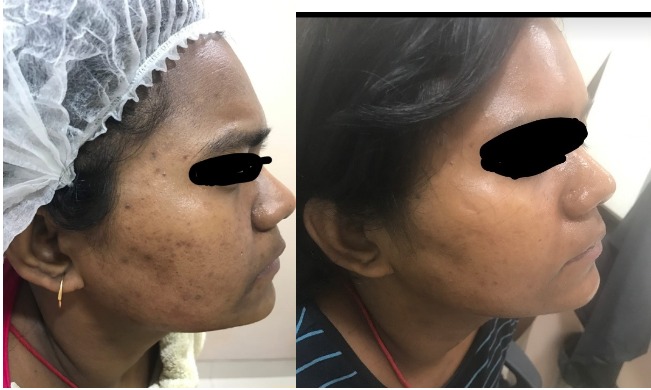
- Tell our readers about your work in the field of cosmetology
Cosmetology has always been close to my heart. I have been lucky to get an opportunity to work closely with cosmetology and dermato-surgical procedures quite early during my post-graduation days and there has been no looking back since. I have worked extensively on the treatment of birthmarks, melasma and various other skin pigmentations with lasers. I am a trained cosmetic dermatologist and have been doing procedures such as LASERS, BOTOX, FILLERS, PRP for face and hair for over 5 years now.
Before and After pic of lip fillers:
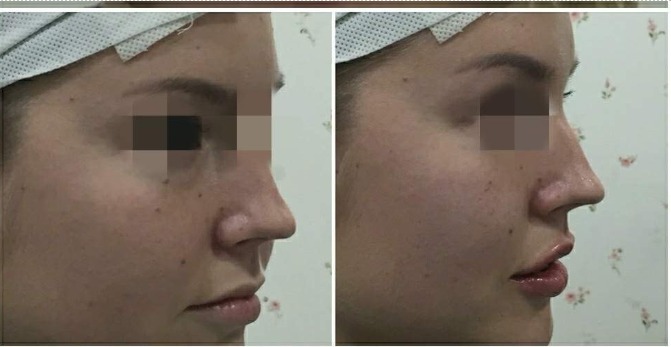
- Surgical wound healing is often a big deal for people with extensive injuries is there a way to make skin grow faster or heal wounds better with modern technology?
Surgical wounds are often difficult to treat specially when there are underlying co morbidities. There are various topical and surgical methods already available for treatment of wounds. Recent advancements have been made in its treatment with PRP. PRP or platelet rich plasma is a treatment wherein the growth factors present in the plasma of the patients own blood is used to treat the wound faster. A freshly prepared PRP is injected into the margins of the wound and this helps in the growth and rejuvenation of the skin. PRP is also used in the treatment of non-healing ulcers.
- PRP sounds promising. what is it exactly? and what kind of patients can benefit from it?
PRP has various roles in medical treatment. As discussed earlier it can be very beneficial in treatment of wounds and non-healing ulcers. In the field of dermatology PRP has now become a rage. It is used for the treatment of Alopecia, hair loss, face and hand rejuvenation. Also known as vampire facial, it used in brides before their wedding for a glowing skin. It can also be used as a maintenance therapy for a healthy and glowing skin in young patients.
Before pic of diffuse Alopecia and after 2 sessions of PRP:
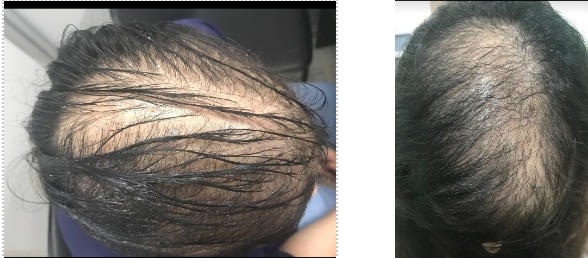
- So in simple terms tell us our readers about how PRP compares with Botox and fillers. Are fillers and Botox different things?
PRP , Botox and filler are all completely different treatments. Many people confuse between them.
PRP is a procedure wherein the patient’s own blood is used for treatment. It is used to give an immediate glow to the skin and also as a maintenance therapy to maintain your skin in the longer run. It is also beneficial in scalp hair growth. It can be done at any age and is very safe.
Botox and Xeomin on the other hand are used to counter wrinkles. They’re a purified form of botulinum toxin which is injected into the muscles to reduce the appearance of wrinkles. It is relatively safe treatment and should be done by an expert dermatologist only.
Fillers are hyaluronic acid injected into the skin at different depths to help fill in facial wrinkles, provide facial volume, and augment facial features, treat acne scars and dark circles, restoring a smoother appearance. They can give you a facelift. Fillers should also be done by a well-trained and qualified dermatologist.
- What is the right age to start skin treatments?
There is no right age to start taking care of your skin. In younger patients using a good Sunscreen of SPF 30 or above, Moisturizer and good cleansing routines does the trick. After the age of 30 one should visit a dermatologist and get some kind of basic skin treatment done to maintain a heathy skin. Get your skin care customized according to your age and skin type by your dermatologist. For advance skin problems like acne, wrinkles and sagging skin get yourself treated
- Should skin problems be treated with over the counter medicines? why not??
No, skin problems should not be treated with over the counter medicines as these creams mostly contain a cocktail of different medicines. Mostly these creams contain steroids which are harmful for the skin in the long run. They might give you temporary relief but will eventually lead to thinning of skin, acne and pigmentation that is difficult to treat. It is always better to get yourself treated by a skin specialist who knows your skin best.
- Does the field of dermatology have emergencies? Tell us about some skin issues that should be treated as an emergency, where ignoring can prove to be a costly mistake
although emergencies in dermatology are rare, there are few diseases which need to be treated urgently as they progress very quickly and lead to significant morbidity and mortality. Most emergencies result from an allergic reaction or infection, but some primary diseases such as Steven Johnson Syndrome, Toxic Epidermal Necrolysis, DRESS Syndrome, Eczema Herpecticum, Necrotizing Fasciitis, Erythroderma to name a few, can become life threatening. Patients suffering from any of these diseases require urgent hospitalization.
- what are the skin conditions that if present should be treated to cure before an elective surgery? does preexisting skin flora has any role in surgical site infections?
One of the many functions of our skin is to act as a barrier to infection. It helps to keeps out bacteria which can enter the bloodstream and cause problems with a replaced hip or knee or any other implant for that matter. This is why it is important that there should be no cuts, grazes or infection at the site of surgery. Disease like superficial fungal infection, Infected eczema, psoriasis, leg ulcers or other open wounds could also lead to server infection. The stress of the surgery can itself cause flaring of the pre-existing skin disease.
- what are the general rules to maintain a healthy skin?
The holy grail to maintain a good skin is to start early and follow a regimen of cleansing moisturizing and protecting religiously. Protect your skin form the harmful UV rays by using good sunscreen with SPF 30 or above everyday even if you are indoors. For oily skin a use a gel-based sunscreen, a water-based moisturizer and a glycolic acid 1% based face wash. Similarly, for dry skin, use a cream-based sunscreen, moisturizer and a gentle cleanser. You can also use vitamin c serums for glowing skin. Drink lot of water,8-10 glasses per day. Modify your diet and sleep well. Follow any type of activity to De stress yourself. Most importantly, meet your dermatologist to access your skin type and customize your skin care.
- you have had the opportunity to work in some of the most advanced dermatological treatment centers and hospitals in multiple states do u think India currently is at par in technologically with the rest of the world in the field of cosmetology and dermatology in general?
I have worked in multiple reputed hospitals and advanced skin clinics in Kolkata and Delhi. The treatments available in the field of cosmetology in India is definitely at par with the rest of the world. In fact, it is better in terms of quality and cost of treatment. I have many international patients who come to me for various cosmetic treatments. They are very happy and satisfied with our treatment quality.
- What is your take on online consultation from dermatological perspective can it be as effective as a regular doctor consultation? given the current environment a lot people have this question in mind
Online consultation is the need of the hour. Since the virus is spreading fast everywhere online consultation is a safer option. Most of the dermatological conditions can be treated through video or teleconsultation. Although there are some serious diseases that do require you to consult in person.
- What do a patient need to have in person before he/she goes for an online video consultation?
It helps if patient has a good quality webcam or cellphone cam, diagnosing skin issues need proper visualization. Patient should be in a well-lit room or location (sunlight preferable). Rest is just like a regular consultation, patients should have their previous medical records ready, the medicine they are already taking should be handy and of course make a list of all the questions you want to ask your doctor.
- Dr. Manmit thank you again for taking part in this public awareness initiative.
My pleasure
